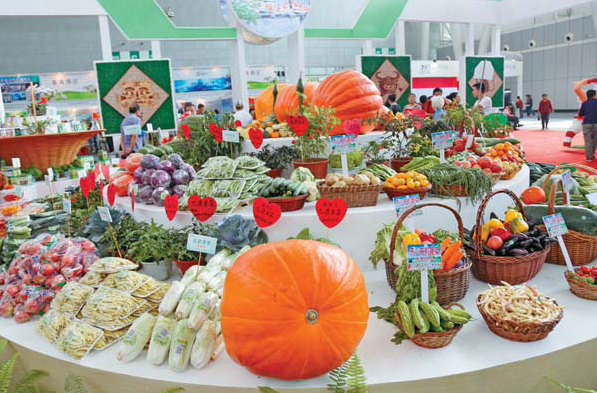Officials: Future in organic and value-added foods
 |
|
Organic vegetables exhibited at the Harbin agricultural expo. Wei Yisong / For China Daily |
The future of Heilongjiang's agriculture should rely on "green" food production and processing, said industry insiders and local officials during a recent agricultural expo in Harbin.
The 2013 Harbin Agricultural and Food Expo opened on Sept 5 in the provincial capital Harbin with the participation of about 1,500 enterprises.
Heilongjiang is one of the leading agricultural provinces in China, and insiders said the province is now in a transition from a big grain grower to a high-quality green food hub.
They said Heilongjiang's biggest advantage for green food production is its excellent ecological environment.
The province has one of the world's three black soil zones. Full of organic nutrients, the land is much more fertile than that in other places of the country.
Local agricultural officials said average annual use of chemical fertilizers in the province is only a third of that in other regions.
In the often cold northeast, Heilongjiang's soil freezes during the long winter, making it hard for pests to survive.
So use of pesticides is only about one seventh of other regions in China, said the officials.
The province's good ecology is also shown by the dense forests that cover 45.2 percent of the land and its abundant water resources in rivers, lakes and wetlands.
"The potential of Heilongjiang's green agriculture has become known to the world in recent years," said Quan Hongjie, general manager for sales at the Heilongjiang-based Tiantong Agricultural Technology Development Co.
His company uses local agricultural products as raw materials.
"Our germ oil made from non-transgenic corn recently gained the approval of European market regulators," he said.
Li Cuiguo, an executive at the local Yizhu Fruits and Vegetables Plantation Co, said the green food industry brings more added value to farmers and companies.
He told China Daily that the organic watermelons they produce can be sold at about 20 yuan per kilo, while ordinary melons are priced below 1 yuan a kilo.
The provincial government regards green food as a pillar of the local economy and an effective way to modernize agriculture.
According to the Heilongjiang Green Food Development Center, by the end of 2012, cultivation of organic and pollution-free crops covered 67 percent of the province's total farmland.
Lu Hao, governor of Heilongjiang, called for the establishment of an extended value chain to cover production, processing and distribution.
He quoted data from the economic research center at the provincial agricultural department that said more than 80 percent of crops are processed into finished products in developed countries, while the rate in China was only 51 percent.
"The gap indicates that there will be a big potential for food processing in Heilongjiang as well as China. This will bring a new change to the existing agricultural industry," said Lu.
The Harbin Agricultural and Food Expo closed on Sept 8. Contracts amounting to 9 billion yuan ($1.47 billion) were signed during the four-day event, according to Li Wei, director of the Harbin Council for the Promotion of International Trade, one of the organizers of the event.
The expo received 255,000 visitors and onsite retail sales surpassed 95 million yuan, Li said.


















